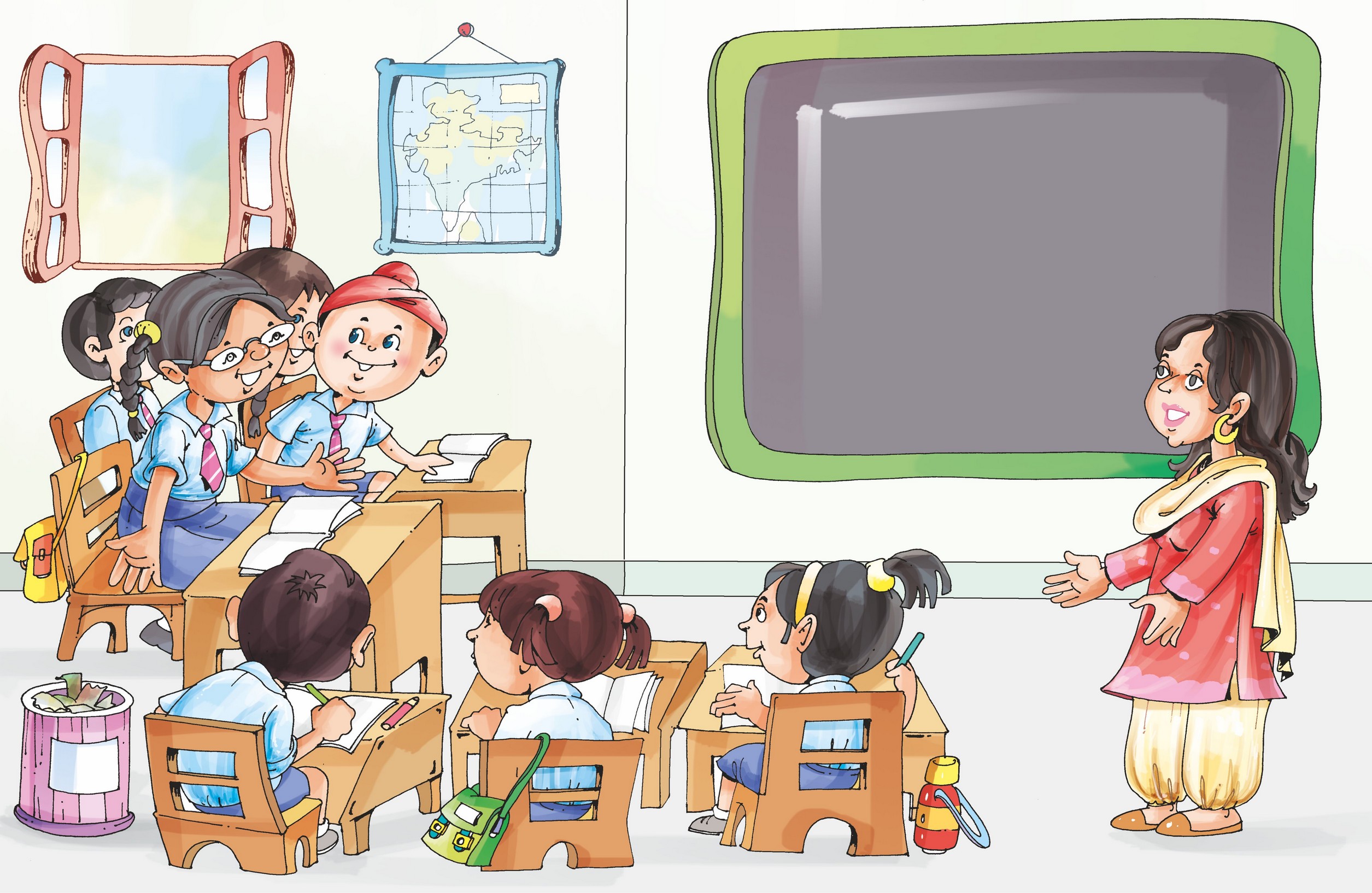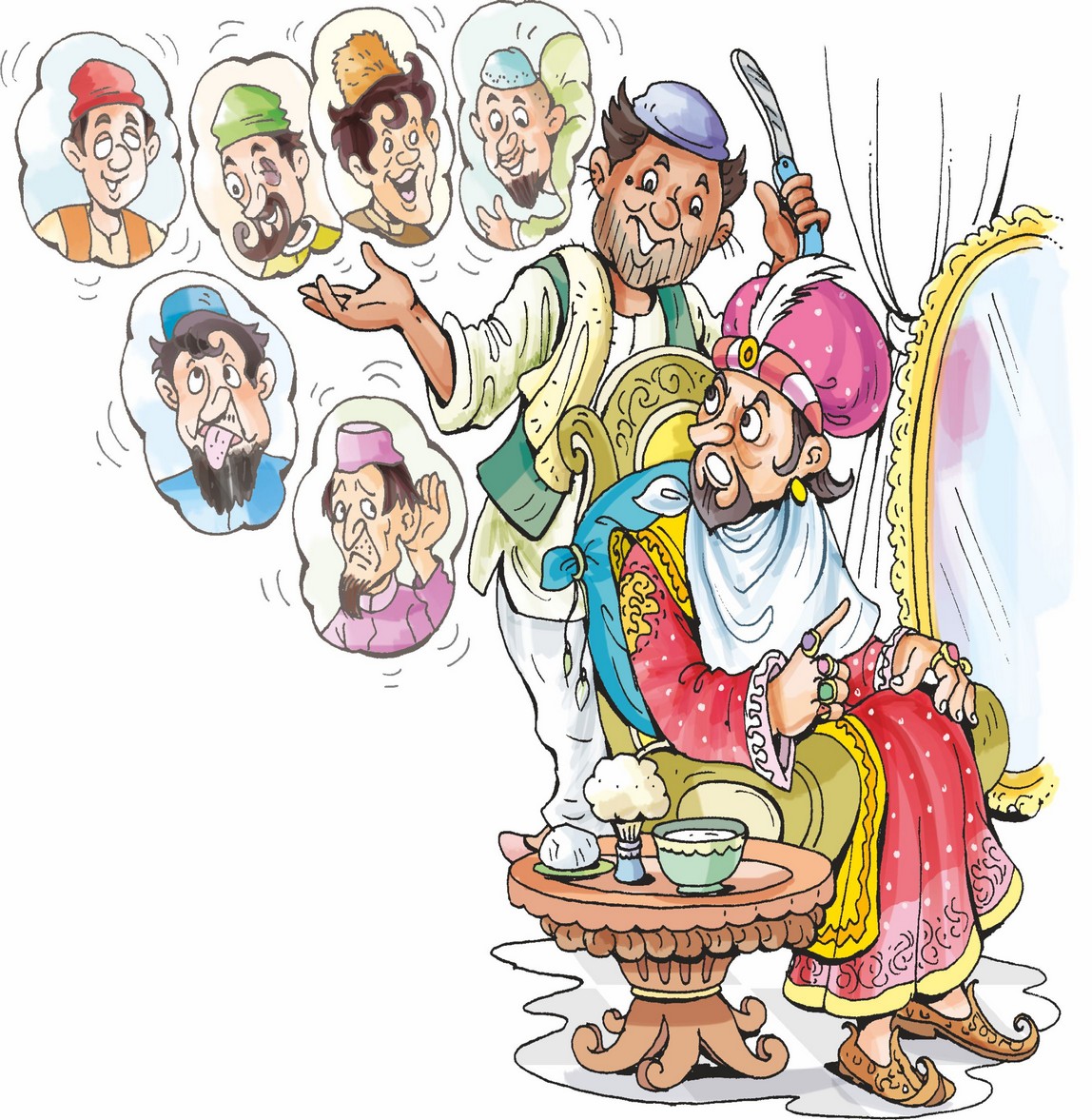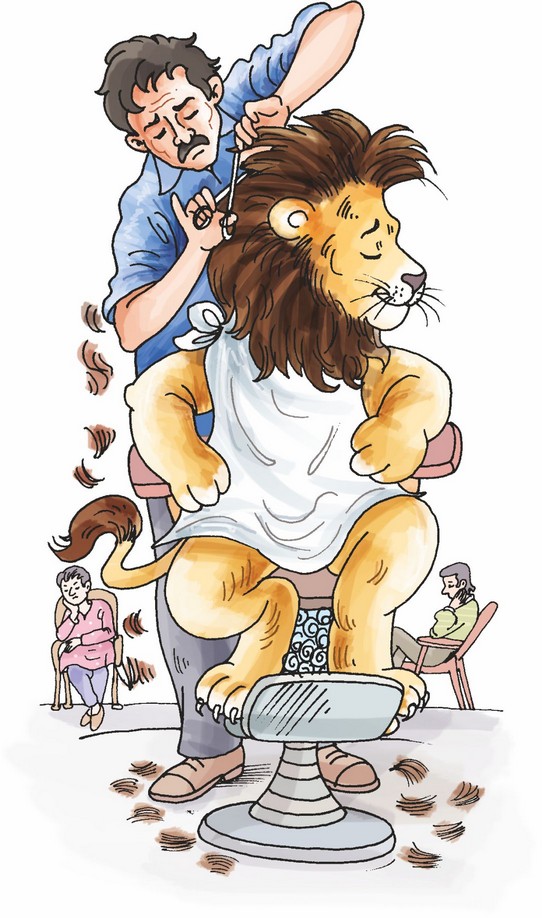Table of Contents

Unit 6: Class Discussion
Recite and Discuss
“In the class discussion Jane, you hardly said a word. We all aired our opinions but from you we barely heard. You sat and stared in silence surrounded by the chatter,
Now tell me Jane,
and please be plain,
is there anything the matter?”
Jane looked up and then she spoke,
Her voice was clear and low:
“There are many people in this world
Who are rather quiet you know!”
GERVASE PHINN

New Words
discussion : talking together in a group on a single topic
aired : make public
barely : only just
stare : look fixedly with eyes wide open
plain : (here) clear
Let’s Read
1. What activity was going on in the class?
2. Who was the quiet one in the class?
3. Why was she quiet?
(i) she was afraid to air her opinions.
(ii) she hated the noise.
(iii) she didn't like the activity.
(iv) she was quiet by nature.
4. How do you interact in class during discussions? Do you participate or remain quiet?

Think and Write
Choose two friends in your class who are very different from each other. Use the clues in the box to describe their nature. You may also add your own words to describe them.
Naughty
Lively
Sharing
Careless
studious
quiet
friendly
helpful
regular
cheerful
___________________________________________________________________
___________________________________________________________________
___________________________________________________________________
___________________________________________________________________
Let’s Talk
1. What is a Discussion?
To discuss means to talk together or decide something. When you do this, you are taking part in a discussion.
Read the sentences below. They tell us what happens in a discussion.
1. In a discussion each person gives his ideas one by one
2. Some tell why something should be done. Others may tell how.
3. Participants ask questions and answer them.
4. Many ideas are given. Everyone helps to decide which ideas are the best.
Note the points you might discuss before planning a visit to the park.
(i) Choose a day and time.
(ii) What things to bring to play?
(iii) Assign duties.
(iv) Things to eat.
Look at the picture in the poem. Imagine and write what the discussion in the class is about.
2. Fill in the grid given below by assigning qualities to each person. Some clues are given here to help you.
Clues
1. Sangeeta lends her pencil to her partner.
2. Nirav is also called a chatterbox.
3. Pranav recently saved a cat from drowning in the lake.
4. Megha is just the opposite of Nirav.
5 .Mithila always teases everyone.
6. Ritu is always seen with a book in hand.
| brave | naughty | quiet | talkative | generous | studious |
Nirav |
|
|
|
|
|
|
Pranav |
|
|
|
|
|
|
Megha |
|
|
|
|
|
|
Mithila |
|
|
|
|
|
|
Ritu |
|
|
|
|
|
|
Sangeeta |
|
|
|
|
|
|
Le’ts Read and Do
1. Children who show exceptional bravery are honoured with the bravery award to recognise their presence of mind.
2. In 1957, the Indian Council of Child Welfare started these National Bravery Awards.
3. Brave children are awarded cash prizes, free school education and a certificate from the Prime Minister of India. They ride on an elephant in the Republic Day parade.
4. Harsh Srivastava, a 12 year old boy, and his 15 year old sister rescued a child from the attack of a raging bull.
5. Yumnan Jayadeo Singh, 11 years old, jumped into the flooded river, and saved a three year-old from drowning. The act of bravery was recognised because he saved the life of an infant.
Find one story of bravery about a child. You can search for the story by talking to older people or watching a TV programme or from a film.

1. Write down the story. Also mention its source.
2. Narrate the story to the class.
3. Which story did you like the best? Write down your reasons.
Write a Notice
A notice tells who, when, where and what.
The girls and boys of Class V wrote notices for the bulletin board.
1. Read Sheela's notice. Discuss the questions that follow.
Notice
The Drama Committee will meet in the classroom on Monday, at two o’clock. We’ll plan a play for our Annual Day.
Will each one of you please bring a play?
SHEELA
1. Who was to meet?
2. When were they to meet?
3. Where were they to meet?
4. What were they to do?
2. Write a notice about a library committee or a football match.
The Talkative Barber
Long long ago a Sultan, whose name was Shahriar, ruled over a large kingdom. His queen was a good storyteller. Each night she would tell a story to the king. She narrated ancient Persian and Arabic folk stories. This is one of the stories, from the Arabian Nights.
Read this story about a man who cannot stop talking.
In the city of Cashgar, lived a barber who was a great talker. Once the Sultan called the barber to shave his head. The barber started talking non-stop instead of shaving him. The Sultan got angry.
“When are you going to stop talking and begin to do your work?”
The Barber replied, “You do me an injury by calling me a chatterer. For, everyone says I am very quiet. I have six brothers whom you might call chatterers. Their names are Bacbone (buk-bon), Bakbarea (buk-buria), Bakbac (buk-buk), Alcouz (ul-kooz), Alnaschee (ul-nashi) and Schacabac( shaka-bak). One is humpbacked, one is toothless, one is half blind, one is quite blind, one is deaf and the other has a defect in his speech and they are all great talkers, but I am the youngest of my family, and I am very quiet and sparing with words.”

“Give him three pieces of gold,” the Sultan cried, losing all patience, “and send him away. I will not be shaved today.”
“My Master,” cried the Barber, “it was not I who came to seek you, it was you who ordered me to come. So I will not quit your house till I have shaved you.”
He then began narrating another story, which lasted half an hour.
“Stop making your fine speeches and let me go quickly. I have an affair of the greatest importance. I have to go out at noon,” said the Sultan.
When he saw that the Sultan was really angry with him, the Barber said, “O Master, do not be angry, I will begin to shave you.” Saying this, he washed the Sultan’s head and began to shave. But he had not touched him even four times with the razor, when he stopped and said, “My Master, you are acting hastily in this matter.”
“Go on shaving me, speak no more”, ordered the Sultan.
“Be patient,” said the barber, “perhaps you have not considered well what you were going to do. I wish you would tell me what this matter of great importance is all about and then I will give you my opinion on it.”
“Finish shaving at once,” the Sultan exclaimed. But, instead of doing this, the Barber left the Sultan halfshaved to go and see what time it was.“ My patience is exhausted,” the Sultan cried.
“Be calm, my Master and you shall be shaved in a moment,” said the Barber and saying this, he continued shaving the Sultan. But while he was doing this, he could
not help talking.
“If you could inform me what this important affair is, I would give more advice, which you might find useful,” he said.
The Sultan was completely fed up by now and decided to satisfy the barber. He told him that he was giving a feast to some friends at noon which was why he was in a hurry to leave.
When the barber heard the Sultan mention a feast he exclaimed, “That reminds me. Yesterday, I invited four or five friends to come to my house today. But I had quite forgotten it and have not made any preparations for them.” The Sultan who was at the mercy of the Barber, was ready to do anything to be rid of him.
“Be quick and finish your work,” the Sultan replied, “and you shall have all the food that has been prepared for me today.”
“Please show me the food so that I may judge if it is enough for my five friends.”
“I have enough food for you!” the Sultan exclaimed.
But he ordered that all the food prepared for his feast be brought in.
The Barber looked over the food and said “This is very good but I shall want some fruit for the dessert also.” The Sultan, in desperation, since his head was half shaved, ordered that the fruits should also be brought in.

The Barber left off shaving the Sultan to examine each dish separately. This took up half an hour. The Sultan stamped his feet impatiently but the Barber did not hurry. At length, however, he again took up the razor but after a few minutes of work, stopped suddenly and cried, “ I never knew that you were so generous.”

New Words
chatterer : someone who talks a lot
defect : a fault
opinion : what a person feels about a person, thing or subject
exhausted : tired and fed up
dessert : a sweet dish served after the main meal
examine : to look at something very carefully
at length : at a stretch
Let’s Read

1. How many brothers did the Barber have?
2. Why was the Sultan in a hurry?
3. Why did the Barber take so long to shave the Sultan?
4. Write True or False.
(i) The Barber was shaving the Sultan’s beard. _____
(ii) The Sultan gave him three gold coins. ______
(iii) The Barber refused to leave the Sultan’s palace. _____
(iv) There were seven brothers altogether in the Sultan’s family. _____
5. Why did the Barber want a lot of food?
Let’s Listen
A lion

A lion emerged from his lair
For a short summer cut to his hair,
But the barber he wept,
While his customers slept
As they waited their turn in the chair.
JOSEPH G. FRANCIS
Let's Talk
1. Did the Sultan enjoy the Barber’s talk? Why do you say so?
2. Which part of the story did you find the funniest?
3. What are the things the Sultan gave to the Barber?
4. Do you think the Sultan was really very generous?
Why do you say so?

Word Building
1. Study the words in the first column and see the changes in them in the second column. The words in Column II are the opposites of the words in Column I.
I | II |
important | unimportant |
patient | impatient |
pleasure | displeasure |
Now write the opposites of the following using un-,im- ,dis-.
(i) believe _____
(ii) shaved _____
(iii) perfect _____
(iv) satisfy _____
(v) polite _____
(vi) respect _____
(vii) pure _____
(viii) expected _____
(ix) obedient _____
2. Fill in the blanks by adding ,un-,im- or dis-to the words given in the box.
tidy
patient
kind
like
able
appear
possible
(i) The teacher got upset with Rani because her work was _____.
(ii) The dog was_____ to climb the tree to chase the cat.
(iii) I _____hot milk, I like it cold.
(iv) It is _____ to cross the road during peak traffic hours.
(v) The magician waved his magic wand and made the rabbit _____.
(vi) The passengers became_____when the train was late again.
(vii) It is very_____to make fun of another person’s weaknesses.
3. Notice the highlighted words in the sentence given below.
You ordered me to come, so I will not quit your house till I have shaved you.
While he was shaving me, he could not stop talking.
Now use the joining words give in the box to fill in the blanks.
If
or
till
where
unless
so
while
(i) Please wait with me _____ the bus arrives.
(ii) Do you like football _____ cricket?
(iii) My father packed my lunch _____ my mother combed my hair.
(iv) We will reach on time _____ we go by the car.
(v) Your speech cannot be heard by the audience _____ you use a powerful mike.
(vi) It was a beautiful day _____ they decided to go for a picnic.
(vii) We went to the zoo _____ we saw many animals.
Word Fun
1. Look at the words in the bubbles.

sit drink play yell dance sing serve run enjoy buy wave shout ride greet win cheer compete
Write what you do when you are at a
(i) feast? _____
(ii) race? _____
(iii) cricket match? _____
(iv) cinema? _____
(v) fair? _____
(vi) party? _____
Let’s Write
How does your father/uncle shave his face every day?
He lathers his face with shaving cream, then he uses his razor. He runs it over his face, in even strokes. After this, he washes his face and wipes it to get rid of the lather.

Now describe two of the following processes.
(i) How to send a letter/e-mail.
(ii) How to make a salad.
(iii) How to prepare a garden bed to grow flowers.
(iv) How to paint a mural or a wall picture.

Teacher’s Page__________________________________________UNIT 6
Poem: Class Discussion
Story: The Talkative Barber
THEMES
Humour
Awareness about different kinds of personalities — talkers, quiet people and brave people
READING TIME
The use of a dictionary while doing all the vocabulary exercises should be encouraged to help students gain confidence when they come across new, challenging words. The teacher can ask the children to read stories from and other witty and humorous stories, e.g. Tenali Raman, Akbar-Birbal etc.
CONVERSATION TIME
Ask the children to talk about wit and humour and understand their importance in life. The teacher should explain that we must also learn to laugh at ourselves.
Some people talk too much and do not realise what they are saying while others do not say a word. In both cases, the problem may be shyness. The teacher can help children gain self-confidence by carrying out group activities like singing, dancing, acting, sports, or a hobby like craft, painting etc. When the child discovers he is good at something, it shall boost his self- confidence. Remember, every child has something to say and has some insight to contribute to a class discussion. The teacher needs to recognise this and help the children gain onfidence, and teach them to be courteous and civil.
WRITING TIME
Before starting on the writing exercise, the teacher could do a guided writing piece, step-by-step, on the blackboard.
PROJECT WORK
What does being brave mean?
Telling the truth, not being tempted to do naughty things, not hiding things from parents, being generous, all require children to be brave. Saving someone's life, catching thieves etc. are brave deeds. Both, being brave and doing brave deeds are creditable. It is not easy to be brave and children should be encouraged to be brave and courageous.
The teacher can then discuss the Republic day parade, and the significance of little children like them being given Bravery Awards.
